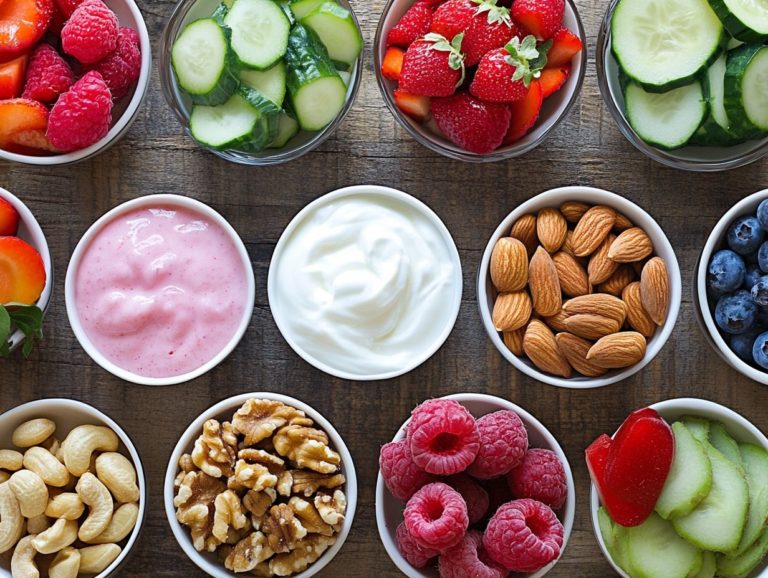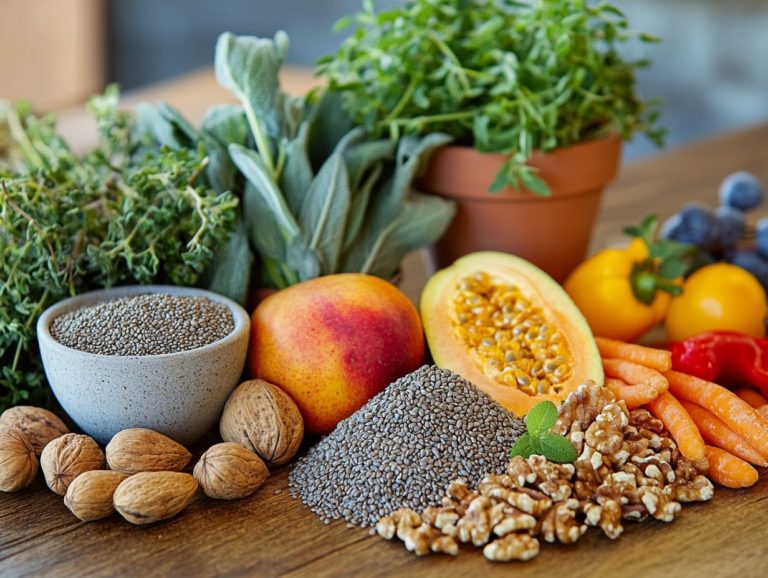How to Integrate Nutrition with Fitness Goals?
In the ever-evolving realm of health and wellness, understanding the relationship between nutrition and fitness is essential for achieving your personal goals. This article explores how your dietary choices impact physical performance and how your fitness routine influences your nutritional needs.
You’ll receive guidance on setting realistic fitness objectives, discover personalized nutrition strategies for weight loss, muscle gain, and performance enhancement, and explore practical tips for integrating both elements into your daily life. Get ready to transform your lifestyle and boost your health!
Contents
Key Takeaways:
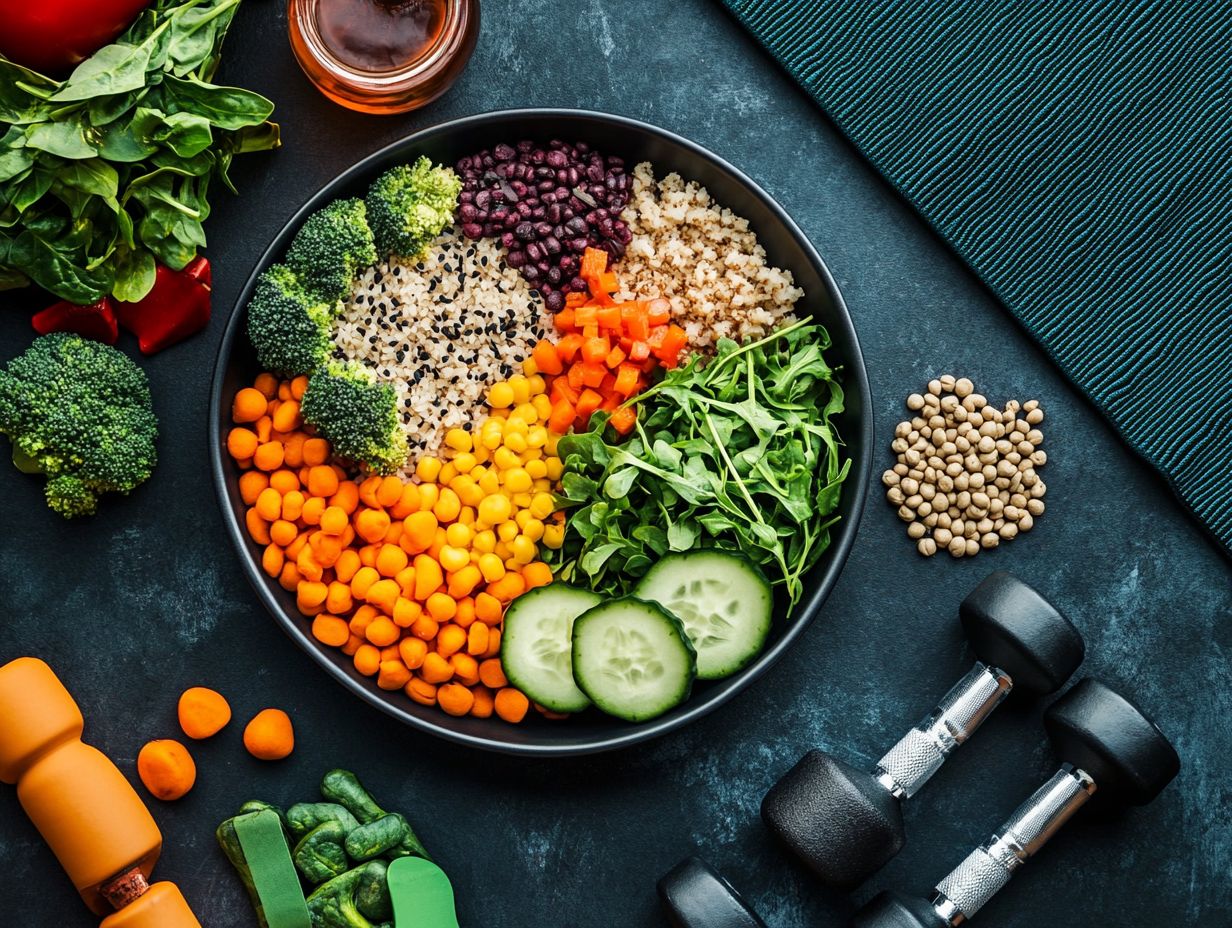
- Proper nutrition is essential for achieving fitness goals, providing the necessary fuel and nutrients for physical activity.
- Setting realistic fitness goals and creating a plan is crucial for success and sustainability.
- Nutrition strategies should be tailored to specific fitness goals, like weight loss, muscle gain, or endurance.
Understanding the Relationship between Nutrition and Fitness
Understanding the relationship between nutrition and fitness is crucial for anyone striving to reach their wellness goals. Nutrition serves not only as fuel for physical activities but also plays a key role in optimizing athletic performance by distributing the main nutrients our bodies need, such as carbohydrates, proteins, and fats.
A well-balanced diet, rich in these nutrients, is essential for muscle recovery, energy production, and overall well-being. By grasping how these two areas interconnect, you can make informed food choices that elevate your fitness levels and support a vibrant, healthy lifestyle.
How Nutrition Affects Fitness
Nutrition significantly influences your fitness journey, directly affecting your energy levels, exercise performance, and muscle recovery through a careful balance of nutrients.
Consider this: fueling up with complex carbohydrates like oats or a banana before your workout can provide the sustained energy you need. After exercising, incorporating proteins such as chicken or Greek yogurt supports muscle repair and growth, greatly impacting your progress.
Don t overlook hydration; it s vital for optimal function during your activities. Including antioxidant-rich foods, like berries, can enhance your recovery, reducing inflammation and delivering essential vitamins.
Ultimately, embracing a balanced diet that includes nutrient-rich choices can dramatically influence your journey toward achieving your fitness goals.
How Fitness Affects Nutrition
Fitness can shape your nutritional needs as increased physical activity raises your body s demand for energy and nutrient absorption to support muscle function.
When you exercise regularly, adjusting your calorie intake to match your activity levels is essential. If your workouts are high-intensity, you’ll likely need a higher caloric intake. For a more moderate routine, you may require fewer calories but should focus on foods rich in vitamins and minerals for recovery and optimal performance.
Exercise influences your food choices, prompting you to select foods that fuel your workouts and promote overall health. Aligning your nutrition with your fitness goals creates a harmonious relationship where diet and exercise work together to elevate your physical performance and well-being.
Setting Realistic Fitness Goals
Setting realistic fitness goals is a crucial step toward achieving long-term sustainability in your health journey. It allows you to balance your workout routines with the right nutrition strategies.
Whether your aim is weight management, muscle growth, or enhancing overall athletic performance, understanding your personal capabilities and limitations is essential. By aligning your goals with a balanced diet rich in both macronutrients and micronutrients, you can boost your workout efficiency and maintain your motivation throughout your fitness journey.
Start implementing these strategies today, and take the first step toward a healthier lifestyle!
Identifying Your Fitness Goals
Identifying your fitness goals serves as the cornerstone for crafting a personalized approach to health and wellness that aligns with your unique needs and aspirations.
Whether your focus is on weight loss, muscle gain, or enhancing athletic performance, understanding these objectives is crucial in charting the right path forward. Regular self-assessments, such as tracking your progress through measurements or fitness tests, can illuminate your personal strengths and areas that need extra attention.
This reflective practice shapes your training routines and significantly influences your nutritional choices and habits. By aligning your diet with your fitness aspirations, you can fuel your body for success, ensuring you stay motivated and on track toward achieving your distinctive goals.
Creating a Plan to Achieve Them
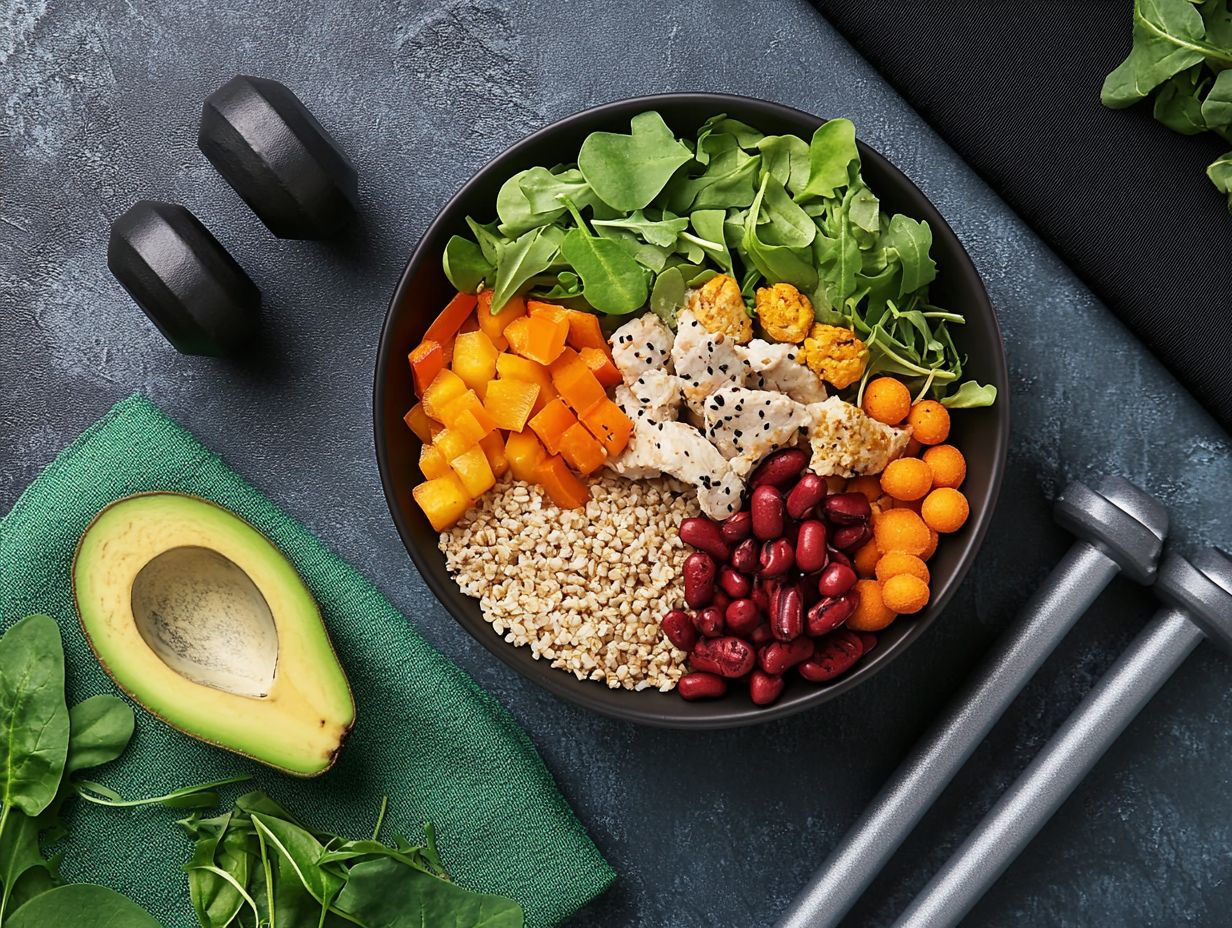
Creating a comprehensive plan to achieve your fitness goals means seamlessly integrating exercise routines with meal planning and timing your meals around workouts to unlock optimal results.
This approach improves your physical performance and overall well-being. By incorporating a variety of fitness regimes tailored to your personal preferences whether that’s cardio, strength training, or yoga you’ll foster balanced development.
Thoughtfully planned meals that emphasize protein intake are essential, providing the fuel your body needs for muscle recovery and growth. This is crucial for anyone serious about enhancing their fitness journey.
Tracking your progress can be easily managed through fitness apps or journals, allowing you to make adjustments based on performance trends. By regularly evaluating both your workouts and your diet, you can make necessary modifications, ensuring you stay motivated and continuously improve.
Nutrition Strategies for Different Fitness Goals
To achieve optimal results, you must tailor your nutrition strategies to your specific fitness goals, whether you re aiming for weight loss, muscle gain, or enhancing your endurance and performance.
Weight Loss
Effective weight loss demands a strategic approach to nutrition that focuses on calorie intake and nutrient density while promoting a healthy lifestyle.
This means creating a caloric deficit consuming fewer calories than your body burns which lays the groundwork for effective and sustainable weight management. By incorporating whole grains, lean meats, and a vibrant assortment of fruits and vegetables, you not only satisfy your hunger but also provide your body with essential nutrients crucial for overall health.
Hydration is equally important; ensuring you drink enough water can boost your metabolism and help curb those pesky cravings. Including anti-inflammatory foods like fatty fish, nuts, and leafy greens will support your recovery and balance inflammatory responses, making your weight loss journey healthier and more enjoyable.
Muscle Gain
To achieve muscle gain, your nutrition plan should emphasize adequate protein intake alongside a balanced distribution of macronutrients. This approach fuels your workouts and enhances recovery.
Incorporating a variety of protein sources think lean meats like chicken and turkey, as well as plant-based options can significantly contribute to your muscle growth goals. If you find it challenging to meet your protein targets through whole foods alone, protein powders offer a convenient alternative.
Pre-workout nutrition is vital for optimizing performance; a well-timed blend of carbohydrates and proteins provides the energy you need for intense sessions.
For example, a meal featuring grilled chicken, quinoa, and steamed broccoli supports muscle growth and aids in recovery. By planning your meals around workouts perhaps enjoying a protein shake paired with a banana beforehand you ensure your body has the necessary fuel while keeping your muscle-building goals front and center.
Start tracking your goals today for a more focused and successful fitness journey!
Endurance and Performance
Nutrition is essential for enhancing your endurance and athletic performance, particularly through optimal carbohydrate intake and effective hydration strategies.
For endurance athletes like you, carbohydrates are the cornerstone of energy production, fueling both aerobic and anaerobic activities that are crucial for maintaining high performance. Recognizing the significance of this type of food that provides energy helps you achieve improved times and greater stamina.
When paired with sound hydration techniques such as pre- and post-exercise fluid intake you can sustain peak performance levels. Nutrient timing, which involves strategically consuming carbohydrates before, during, and after extended workouts, is key to maximizing energy availability and recovery.
Understanding how to balance these elements can significantly influence your overall endurance and capabilities during long-distance events.
Integrating Nutrition and Fitness in Daily Life
Integrating nutrition and fitness into your daily life is essential for cultivating a sustainable, healthy lifestyle that aligns seamlessly with your personal wellness goals. To enhance this journey, learning how to stay accountable with your nutrition goals can further empower you to thrive both physically and mentally, ensuring a holistic approach to well-being that lasts.
Meal Planning and Preparation
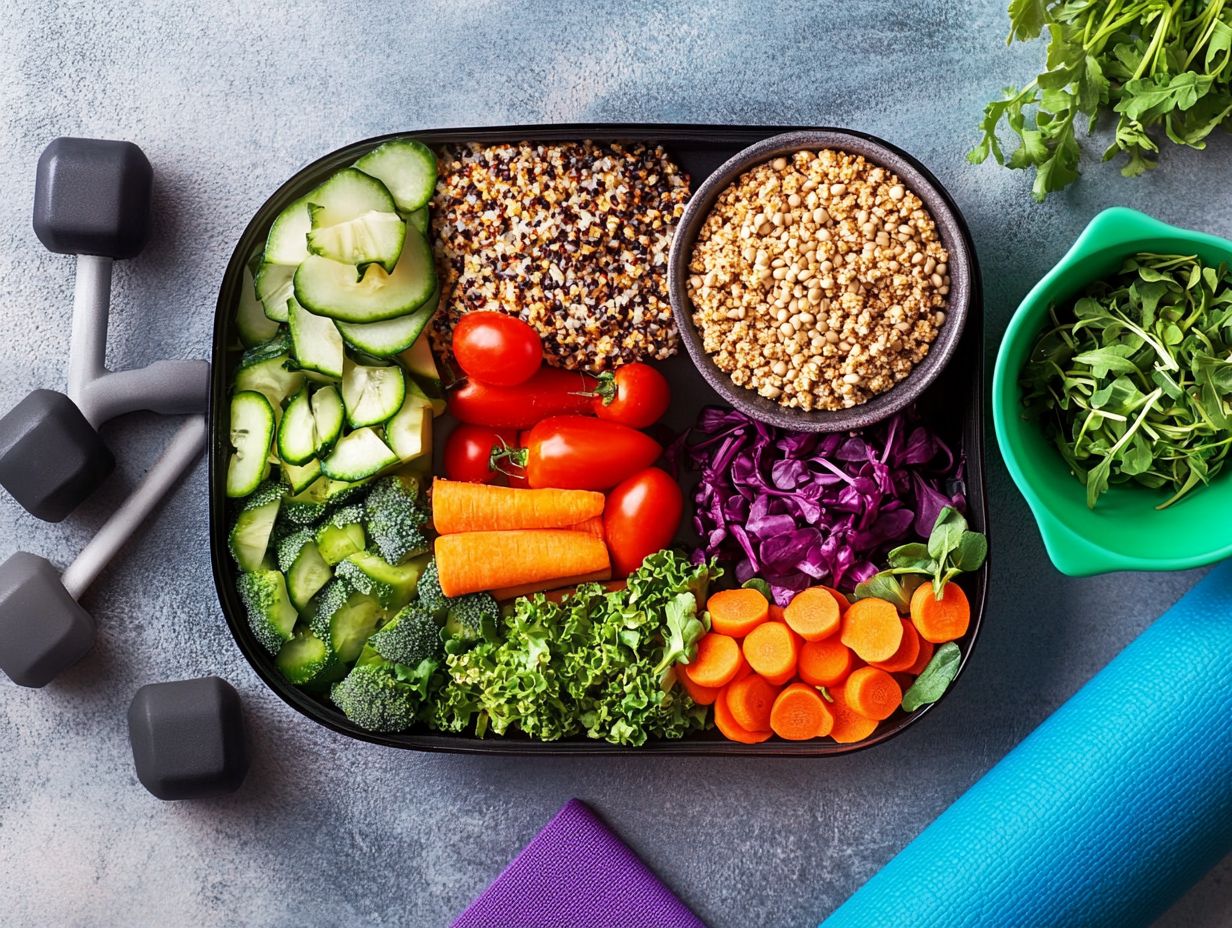
Meal planning and preparation are vital for effective nutrition strategies that can elevate your physical activity and overall fitness.
By dedicating time to thoughtfully plan your meals for the week ahead, you reduce the temptation of unhealthy last-minute options. You also ensure that you include nutrient-rich foods essential for optimal health. Start by assessing your dietary preferences and needs, then craft a balanced menu that features a variety of proteins, complex carbohydrates, and fiber-rich vegetables.
Creating shopping lists can streamline your grocery trips, making it easier to stick to healthier choices. Preparing meals in advance gives you control over portion sizes and saves valuable time during busy weekdays. This proactive approach makes it much easier to stick to your healthy eating habits, even on the busiest days!
Tracking Progress and Making Adjustments
Tracking your nutrition and fitness progress helps you see your achievements clearly and make necessary adjustments to optimize your performance.
Using various methods, you can effectively monitor your fitness journey and ensure alignment with your goals. For example, logging your daily food intake can reveal patterns that significantly impact your energy levels and overall well-being.
Regularly assessing your body composition allows you to adjust your training and diet, promoting muscle gain and fat loss for a more balanced physique.
Paying attention to fluctuations in your energy during workouts can inform modifications to both your exercise routines and nutrition choices. Continuous reflection on these metrics helps you adapt and identify what works best for sustained improvement.
Staying Motivated and Consistent
Remaining motivated and consistent in your fitness journey is essential for achieving your long-term health and wellness goals. This often requires a blend of external support and robust internal discipline.
Finding Support and Accountability
Finding support and accountability through social connections or fitness communities can significantly elevate your motivation and commitment to achieving your wellness goals.
Joining a local fitness group opens the door to sharing experiences, challenges, and victories. This creates an environment where you and your fellow members inspire each other to push your limits together. Hiring a personal trainer offers another layer of support, providing personalized guidance to ensure your techniques are effective and your progress is meticulously tracked.
Utilizing fitness apps or wearable technology adds another dimension of accountability; you can monitor your achievements in real-time and engage in friendly competition with peers. The sense of community whether sharing your workout routines or celebrating milestones plays a crucial role in maintaining enthusiasm and driving long-term engagement in your fitness journey.
Start applying these strategies today and watch your performance soar!
Overcoming Challenges and Plateaus
Overcoming challenges and plateaus in your fitness journey requires strategic adjustments to your workout routines and nutritional plans.
Recognizing when progress stalls is the first step. Many people hit a wall after consistent improvements.
This usually happens because your body adapts to the same workout. It’s crucial to change your exercise intensity and variety.
Try new workouts, lift heavier weights, or adjust your rest periods to break through stagnation points.
Dietary changes can also help. Monitor your macronutrient intake and meal timing for an extra boost!
Being aware of these signs and taking action empowers you to create a more dynamic fitness experience.
Frequently Asked Questions
How can nutrition be integrated with fitness goals?
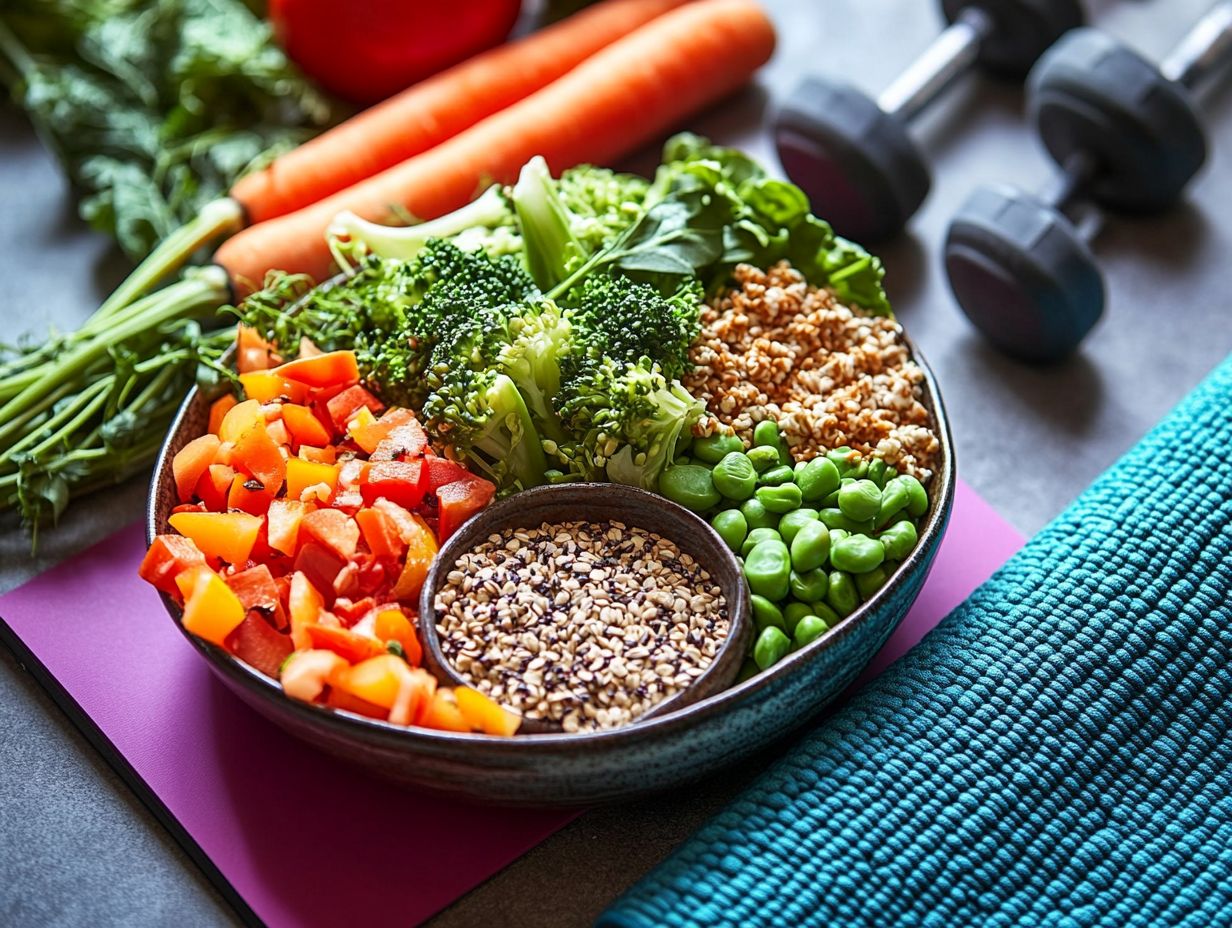
Nutrition and fitness go hand in hand. To fuel your body effectively, learn how to use nutrition to enhance athletic performance and support your activities to reach your fitness goals.
What is the recommended macronutrient ratio?
The typical macronutrient ratio is 45-65% carbohydrates, 20-35% protein, and 10-35% fat. This may vary based on individual needs.
Are there specific foods that aid in achieving fitness goals?
Yes! Lean proteins, complex carbohydrates, and healthy fats are crucial for muscle growth, energy, and overall health.
How can meal planning assist with fitness goals?
Meal planning helps ensure you eat well. By planning ahead, you make healthier choices and avoid impulsive decisions.
Should I track calorie intake?
Tracking calories can be beneficial. It helps you maintain a balance between nutrition and fitness goals.
How does hydration affect fitness goals?
Stay hydrated to unlock your full fitness potential! Water helps your body absorb nutrients and maintain energy levels.

